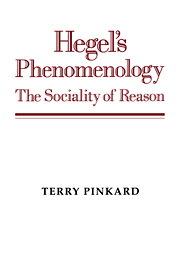Book contents
- Frontmatter
- Contents
- Acknowledgments
- Hegel's Phenomenology
- 1 Why the Phenomenology of Spirit?
- 2 The claims to self-sufficient knowledge: sense-certainty, perception, understanding
- 3 The claims of self-sufficient agency: freedom and self-consciousness
- 4 Modern life's project of self-justification
- 5 Modern life's alternatives and modern life's possibilities
- 6 The self-reflection of the human community
- 7 The essential structure of modern life
- Notes
- Works cited
- Index
3 - The claims of self-sufficient agency: freedom and self-consciousness
Published online by Cambridge University Press: 05 September 2014
- Frontmatter
- Contents
- Acknowledgments
- Hegel's Phenomenology
- 1 Why the Phenomenology of Spirit?
- 2 The claims to self-sufficient knowledge: sense-certainty, perception, understanding
- 3 The claims of self-sufficient agency: freedom and self-consciousness
- 4 Modern life's project of self-justification
- 5 Modern life's alternatives and modern life's possibilities
- 6 The self-reflection of the human community
- 7 The essential structure of modern life
- Notes
- Works cited
- Index
Summary
Self-consciousness and the desire for recognition
Self-consciousness and practice
The claim of the preceding sections was that it was possible for there to be a form of self-sufficient knowledge – that is, some way of knowing things that did not depend on anything outside of some small circle of beliefs that were all either established non-inferentially or were established by making only the most meager of assumptions (such as the assumption that knowers speak a language). The three candidates for such knowledge, however, have been shown to be internally self-defeating; judged on the terms that they set for their own success, they fail to make good on their claims. Moreover, in tracing out the structure of this so-called self-contained knowledge, the proponents of this point of view find that in fact they are only tracing out the structure of “the understanding” itself – that is, they are not tracing out the structure of things but instead the structure of our own conceptualizing activities. Thus, the standpoint of “consciousness” is integrated into this new, more reflective conception of what counts as knowledge, which Hegel terms quite generally, “self-consciousness.” It is characterized by a reflection not on the structure of the things about which we are conscious, but on the structure of our conscious attendings and takings themselves.
In this new, reflective view, the goal of showing that what we take as authoritative really is so seems more readily achievable because the objects of reflection are our reflective activities themselves.
- Type
- Chapter
- Information
- Hegel's PhenomenologyThe Sociality of Reason, pp. 46 - 78Publisher: Cambridge University PressPrint publication year: 1994



